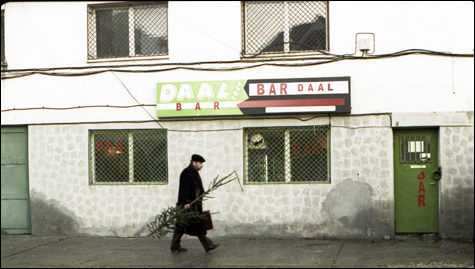
To judge from recent movies from that country, everything in Romania is going to pot. Except Romanian movies. It’s too early to claim the former Warsaw Pact backwater as the locale of the latest “New Wave,” but it has contributed more than its share of film festival favorites recently. Cristi Puiu’s The Death of Mr. Lazarescu won Cannes’s Un Certain Regard Award in 2005, and this year Cristian Mungiu’s 4 Months, 3 Weeks, and 2 Days took that festival’s Palme d’Or, both films impressing audiences with the stark nihilism and affectionate despair with which they examine their homeland’s lot. Add Corneliu Porumboiu’s brilliant, bittersweet, ruefully hilarious comedy, winner of Cannes’s Camera d’Or in 2006, and Romanian cinema seems a reprise of the Czech New Wave of 1968.

Like the films in that short-lived, Soviet-era cinematic renaissance, Bucharest looks with long takes and deadpan irony at the lives of the benighted and disenfranchised, contrasting them with the tacky platitudes of the reigning ideology. It opens with a montage of the lights going out in a dismal town east of Bucharest. It’s December 22, 16 years to the day after Communist dictator Nicolae Ceausescu, besieged by a growing revolution, fled the country at exactly 12:08 pm. To mark the event, Virgil (Teo Corban), the owner of the local TV station, invites locals to his talk show to discuss whether there actually was a “revolution” in their home town.
Revolution or not, the two guests and Virgil himself lead lives of discontent and failure. Manescu (Ion Sapdaru), the history teacher, wakes up on the couch in an alcoholic stupor, the immediate past a blur. He’s blacked out the excesses of the night before and nearly forgets he’s scheduled to appear on the talk show. At school, he gives a make-up exam on the French Revolution to a class that has already flunked an exam on the Ottoman Empire. “Why bother?” says a colleague. “They’re only interested in setting off firecrackers.” And then he reminds Manescu that he owes him money.
If Manescu is a historian with a poor memory, old man Piscoci (Mircea Andreescu) is a Santa Claus who hates kids. He curses the kids who set the firecrackers off (in anticipation of Christmas, not in celebration of the Revolution), and yet every year he puts on the red suit and beard to delude another generation with empty fantasies.
Virgil, meanwhile, has been on the phone all morning trying to muster up guests beyond these two losers. He has no luck, because, as many have already told him, no one gives a shit anymore. Regardless, armed with references to Plato’s cave and his two dubious eyewitnesses, he proceeds, and the next 45 minutes make for disastrous television and brilliant filmmaking.
With Piscoci making paper hats while Manescu sweats through his recollection of the events of the day, the film seems to be settling into broad, if funny, farce. But then it gets as serious as Das Leben der Anderen|The Lives of Others. Some people, apparently, do give a shit, such as the ex-member of the Securitate, the brutal secret police, who calls in threatening to sue. Soon the debate is not about whether the Revolution took place but about whether anything in the past can be known. Or even the present, as the meaning of the discussion itself is battled out on air between Virgil’s direction and a rebellious employee’s camerawork. In Bucharest, history replays as both tragedy and farce.